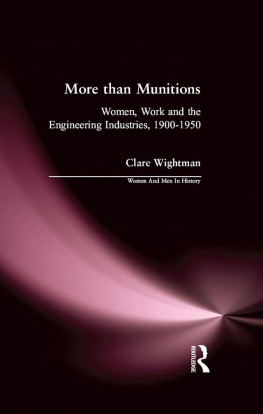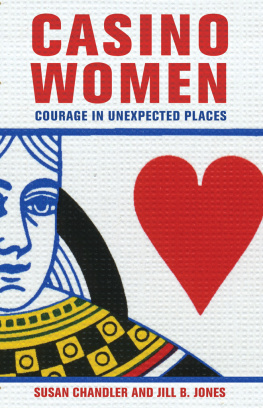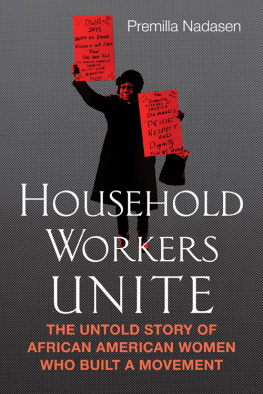Preface
I began to conduct research on the lives of women in Las Vegas in 1995. That research began with the creation of the Nevada Women's Archive (NWA) in the Department of Special Collections, Lied Library at the University of Nevada, Las Vegas (UNLV). Many individuals, including community supporters, faculty, graduate students, and library administrators, brought the archives into existence and collaboratively created a resource for generations to come. In particular, the leadership of Jean Ford, Eugene Moehring, Sue Fawn Chung, Carol Corbett, and Myoung-ja Lee Kwon made our work possible. Since its creation, the professional guidance of Sue Kim Chung has helped expand the resource and keep it accessible for researchers. Out of the NWA came the impetus for an oral history center. Claytee D. White has built that center's collection into a remarkable resource for Las Vegas research. My work with the NWA started me on the path that led to this book.
Research that spans more than a decade garners more debts than I can adequately acknowledge. At the top of my list of people to thank is the large group who collaborated in the creation of the Las Vegas Women Oral History Project under my direction at the Women's Research Institute of Nevada at UNLV. More than ninety women have generously contributed their narratives to the project, even though they modestly wondered why we were interested and what their lives had to do with history. The eleven women whose narratives are presented in this book deserve my particular thanks. They allowed us into their lives, offered us their experiences, shared photographs as well as memories, and trusted in the greater good that this collection of oral histories would produce. This book focuses on women in the gaming and entertainment industry, but all the collected oral histories have helped to shape a new history of women in post-1945 Las Vegas.
The project would never have grown beyond a handful of oral histories had it not been for the students, collaborators, and colleagues who worked with me to collect the interviews. Initial ideas for narrators and much-needed community support came from Thalia Dondero and her daughter, Judy Habbeshaw, who knew the community that I had recently entered. Kim Beach Bach and Joyce Marshall Moore worked in the hotel-casinos and had the initial idea to interview women workers. Claytee D. White joined me and Marshall Moore, Barbara Agonia, Catherine Bellver, Caryll Batt Dziedziak, Layne Karafantis, Brigid Kelly, Myoung-ja Lee Kwon, and Kay Long to collect the oral histories. Angela Moor played many roles in the project and digitally archived the collection. As the project moved into video interviews, Kristin Guthrie played an important role.
Oral histories are a remarkably labor-intensive enterprise. The Las Vegas Women Oral History Project received important early support from Carol C. Harter, president of UNLV at the time. She saw the value of the project for its potential to contribute to Las Vegas history, to build strong faculty-student research relationships, and to strengthen university ties to the community. Financial support came from the UNLV Foundation, the Nevada Humanities, and a significant gift from Emilie N. Wanderer. I am indebted to the history department for offering me a graduate assistant for several years and facilitating the project in numerous ways.
For many years I had the sustained support of colleagues who kept alive the generative ideas and writing. Alice Kessler-Harris's foundational work in the field of women's labor history is matched only by her mentoring of others in the field. Annelise Orleck shared with me her own perspective and wise advice on the antipoverty movement in Las Vegas and its impact on the struggles to open nontraditional jobs. Rickie Solinger encouraged me to make room for my voice in this book while the project was in its infancy. She also counseled me to let the contradictions in the narratives stand on their own. Elizabeth Jameson shared her vast knowledge on women in the West and oral history as well as her sense of humor. My participation in 2006 in Women's Narratives, Women's Lives: Intersections of Gender and Memory, one of the annual summer institutes sponsored by the Columbia Center for Oral History Research, proved crucial to my interpretation of oral histories. I am grateful to Mary Marshall Clark, Ron Grele, and the participants of the institute for their support and ideas. My gratitude extends to Bob Hogan, the director of the Nevada Community Enrichment Program. The assistance given by Bob and his staff made my progress on the book possible. A national network of friends and scholars discussed the varied and diverse aspects of this book over meals, online, in conference papers, and in publications. My thanks to Eileen Boris, Nancy Busch, Susan Chandler, Nupur Chaudhuri, Sue DiBella, Elizabeth Faue, LeAnn Fields, Sherry J. Katz, Virginia Nelson, and Mary Elizabeth Perry for their help as I shaped my thoughts.
My colleagues in the UNLV history department offered significant questions, ideas, and prodding. I am especially indebted to Eugene Moehring, whose knowledge of Las Vegas and urban history laid the foundation for new scholarship on the city. Andy Fry led the department and provided important institutional support during crucial years in the project's development. Sue Fawn Chung offered a positive example of combining university research with community engagement. Elspeth Whitney and Marcia Gallo provided gendered analysis as well as good friendship. Greg Hise, Andy Kirk, David Tanenhaus, and Paul Werth supported me through my academic process in varied and numerous ways.
One of my communities of support over the past fifteen years has been the staff, advisers, and students associated with the Women's Research Institute of Nevada (WRIN). Founded in 1999, WRIN has been a center for research and education programs based in gender analysis at UNLV. The institute found a home in the College of Liberal Arts and received much-needed office space and varied forms of support from Dean Chris Hudgins. The shared vision of my coworkers and colleagues Caryll Batt Dziedziak, Venicia Considine, Juliana Ormsby, Angela Moor, Crystal Jackson, Diana Thu-Thao Rhodes, Roberta Sabbath, Alma Castro, Barbara Agonia, Lorri Jackson, Deborah Campbell, and Tamara Marino provided the positive context in which I could ultimately complete this book.
The final details of getting a book published can give anyone aches and pains. I am grateful, therefore, for the fine assistance of the photo curators who made my job less of a burden. Ginny Poehling and Alex Hutchings at the News Bureau Archive of the Las Vegas Convention and Visitors Authority, Dolores Brownlee of the Special Collections Department of Lied Library at UNLV, Annie Segan of the Arthur Rothstein family, and Geri Kodey of UNLV Photo Services offered timely assistance. Several individuals included in the book loaned us their personal photos to benefit the oral history. I am particularly grateful for the generosity of Carolyn McClure and Carole Crew. Joanne O'Hare and Matt Becker of the University of Nevada Press patiently waited for the manuscript, and I am pleased to have chosen the press to publish the book. The anonymous readers of the manuscript went beyond the norm with comments and suggestions that have improved the book immeasurably.





